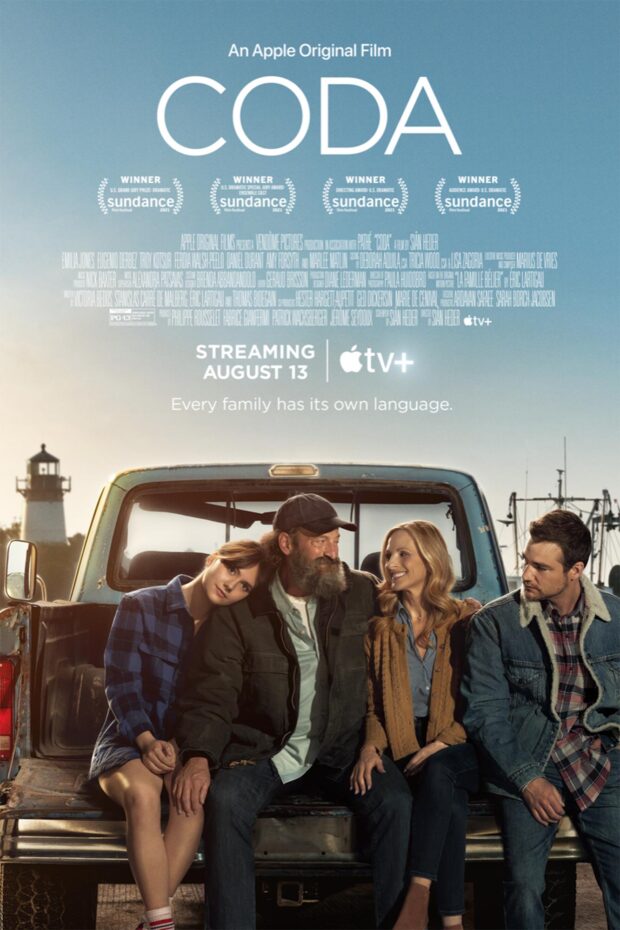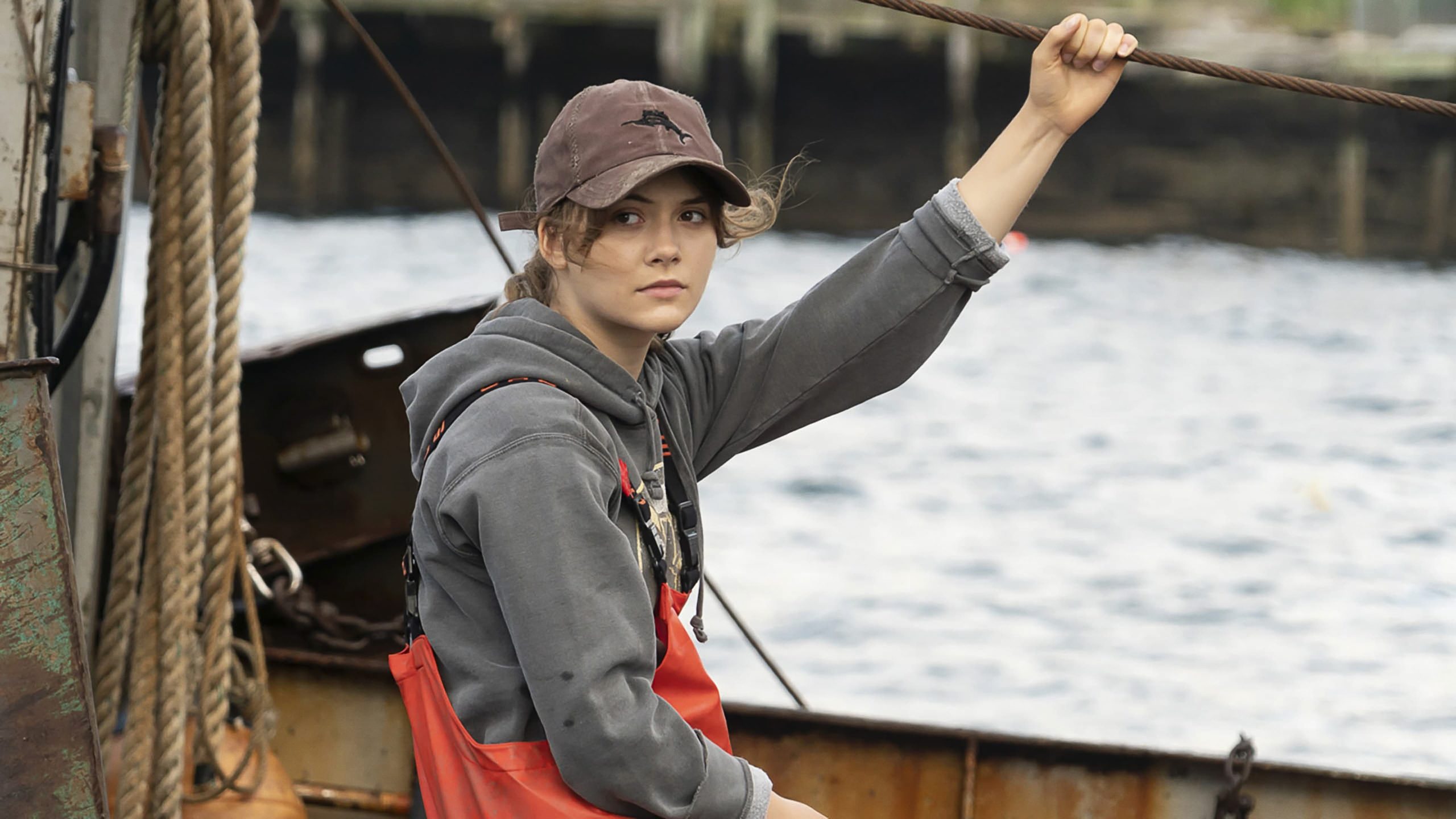
Hear and there
CODA is unbearably cloying and contains barely a single narrative beat that isn't an ossified cliché. Naturally, it has been greeted with rave reviews and a spirited bidding war in the wake of its opening-night premiere at the Sundance Film Festival; elevating sentimental schlock made with little more than the most functional artistry has been one of the main functions of Sundance for decades, and CODA has the added benefit of being superficially "about representation", in that the people who make the protagonist's life difficult are all deaf, and are played by deaf actors. Not the protagonist herself, of course; that would run the risk of making things challenging for us, and potentially even having something new to say about the human condition (or even just overwrite memories of the still very recent Sound of Metal, which I didn't love very much, but which now looks like a masterpiece of respectfulness and delicacy).
Avoiding having anything new to say is something of a driving passion of CODA, whose story and conflicts are predictable in virtually every detail, down to which minute of the running time they will appear in. Okay, that's not fair. I did not predict that there would be a subplot about attempting to break the monopoly of a fresh seafood distributor by rousing several disgruntled Gloucester, MA fishermen to form an independent co-op, but this is only because the film has absolutely nothing to say about this, other than to use it as an unreasonably elaborate narrative complication; it is the most conspicuous and aggravating of the loose threads and narrative cul-de-sacs with which writer-director Siân Heder has decorated her script.
But I was about to talk about the predictability. Ruby (Emilia Jones) is a CODA - a child of deaf adults - and is moreover the only member of her family who can hear; thus does she act as the conduit between father Frank (Troy Kotsur), mother Jackie (Marlee Matlin), and brother Leo (Daniel Durant), and the rest of Gloucester. While presumably Frank and Jackie must have at one point navigated the world just fine on their own, it would appear that these skills have atrophied, and indeed the primary question of the movie is whether Ruby will be able to go off to college, or whether the dire cost to her family of losing this tether to the hearing world will cause her so much guilt that she keeps burying her dreams to support them. Those dreams, which appear to be pretty much brand new when we we meet her, involve training to become a great singer, as she is in the process of discovering how good she is at it, and how much she specifically likes that singing in the school music club puts her in contact with cute boy Miles (Ferdia Walsh-Peelo). The singing instructor, Bernardo "Mr. V" Villalobos (Eugenio Derbez, unusually insufferable and kitschy) is convinced she has Something and pushes her to develop it with rather obnoxious fervor, not caring about the strain this puts on her already tense relationship with her parents, who are proving awfully slow to accept that she's growing up and developing a life outside of the family fishing business.
It would be impossible to overstate how precisely, down to the most microscopic level, this plays out exactly as you would expect, from the embarrassing thing the parents do that causes Ruby a bad day at school, to the angry shouting match based on poor communication that puts a rift between her and the cute boy (in a film whose supporting characters are not especially well-defined, Miles is far and away the most generic), to the moment where the family rallies to rush to a last-minute race-against-the-clock performance that will make or break Ruby's future. Literally the only thing that gives it even the slightest hint of a personality is that three of the six main characters are deaf, and while this does end up with some nice specific moments that are built specifically on the challenges a girl in Ruby's position would experience (and these moments are invariably CODA's best, especially the big performance where we're pointedly reminded of the irony running through the entire film, that her Big Dream cannot be experienced directly by her family), for far too much of the running time, deafness feels like a gimmick, this film's version of the oddball quirk that the main character first pushes against and then embraces in stories like this.
It certainly doesn't help this impression that CODA is entirely Ruby's story, and Frank and Jackie are neither more nor less than My Wacky Deaf Parents: Kotsur and Matlin are both terrific at making the characters feel particular and based in something genuinely human, but the roles still both demand a lot of big hammy eye-rolling and broad jokes about swearing like sailors using sign language and not realising that they're having loud sex, big comic gestures that feel vaguely naughty and edgy only because of aggressively square the rest if the film is. This kind of intrusion of vulgar material into nice sitcom material is its own cliché at this point, and stacked atop all the other clichés CODA indulges in, it makes it that much harder for Kotsur and Matlin's genuinely delicate character work, or their playful rapport with Jones (whose work is a little too dependent on what she's being fed by her scene partners for me to feel comfortable joining in the "a star is born!" hosannas, though she does have undeniable screen presence), to land amidst the general corny shtickiness.
Given its undemanding broadness, it is of course no surprise that CODA is aesthetically bland, with its most distinctive stylistic touch being its overreliance on musty old song cues, both in the form of montages and the strange, inappropriate numbers that the ludicrous Mr. V forces on his students. The name of the game here is smooth proficiency that stays out of the way of the simply, straightforward emotional prompts in the drama; this is the kind of film which rarely produces a striking or memorable image, and when it does so, seems to have done it by accident. There's need for evocative images when a film is nice, after all, and that's what CODA is doing: being nice, to the point where it has no space left over for other minor things, like being interesting, or honest, or insightful.
Avoiding having anything new to say is something of a driving passion of CODA, whose story and conflicts are predictable in virtually every detail, down to which minute of the running time they will appear in. Okay, that's not fair. I did not predict that there would be a subplot about attempting to break the monopoly of a fresh seafood distributor by rousing several disgruntled Gloucester, MA fishermen to form an independent co-op, but this is only because the film has absolutely nothing to say about this, other than to use it as an unreasonably elaborate narrative complication; it is the most conspicuous and aggravating of the loose threads and narrative cul-de-sacs with which writer-director Siân Heder has decorated her script.
But I was about to talk about the predictability. Ruby (Emilia Jones) is a CODA - a child of deaf adults - and is moreover the only member of her family who can hear; thus does she act as the conduit between father Frank (Troy Kotsur), mother Jackie (Marlee Matlin), and brother Leo (Daniel Durant), and the rest of Gloucester. While presumably Frank and Jackie must have at one point navigated the world just fine on their own, it would appear that these skills have atrophied, and indeed the primary question of the movie is whether Ruby will be able to go off to college, or whether the dire cost to her family of losing this tether to the hearing world will cause her so much guilt that she keeps burying her dreams to support them. Those dreams, which appear to be pretty much brand new when we we meet her, involve training to become a great singer, as she is in the process of discovering how good she is at it, and how much she specifically likes that singing in the school music club puts her in contact with cute boy Miles (Ferdia Walsh-Peelo). The singing instructor, Bernardo "Mr. V" Villalobos (Eugenio Derbez, unusually insufferable and kitschy) is convinced she has Something and pushes her to develop it with rather obnoxious fervor, not caring about the strain this puts on her already tense relationship with her parents, who are proving awfully slow to accept that she's growing up and developing a life outside of the family fishing business.
It would be impossible to overstate how precisely, down to the most microscopic level, this plays out exactly as you would expect, from the embarrassing thing the parents do that causes Ruby a bad day at school, to the angry shouting match based on poor communication that puts a rift between her and the cute boy (in a film whose supporting characters are not especially well-defined, Miles is far and away the most generic), to the moment where the family rallies to rush to a last-minute race-against-the-clock performance that will make or break Ruby's future. Literally the only thing that gives it even the slightest hint of a personality is that three of the six main characters are deaf, and while this does end up with some nice specific moments that are built specifically on the challenges a girl in Ruby's position would experience (and these moments are invariably CODA's best, especially the big performance where we're pointedly reminded of the irony running through the entire film, that her Big Dream cannot be experienced directly by her family), for far too much of the running time, deafness feels like a gimmick, this film's version of the oddball quirk that the main character first pushes against and then embraces in stories like this.
It certainly doesn't help this impression that CODA is entirely Ruby's story, and Frank and Jackie are neither more nor less than My Wacky Deaf Parents: Kotsur and Matlin are both terrific at making the characters feel particular and based in something genuinely human, but the roles still both demand a lot of big hammy eye-rolling and broad jokes about swearing like sailors using sign language and not realising that they're having loud sex, big comic gestures that feel vaguely naughty and edgy only because of aggressively square the rest if the film is. This kind of intrusion of vulgar material into nice sitcom material is its own cliché at this point, and stacked atop all the other clichés CODA indulges in, it makes it that much harder for Kotsur and Matlin's genuinely delicate character work, or their playful rapport with Jones (whose work is a little too dependent on what she's being fed by her scene partners for me to feel comfortable joining in the "a star is born!" hosannas, though she does have undeniable screen presence), to land amidst the general corny shtickiness.
Given its undemanding broadness, it is of course no surprise that CODA is aesthetically bland, with its most distinctive stylistic touch being its overreliance on musty old song cues, both in the form of montages and the strange, inappropriate numbers that the ludicrous Mr. V forces on his students. The name of the game here is smooth proficiency that stays out of the way of the simply, straightforward emotional prompts in the drama; this is the kind of film which rarely produces a striking or memorable image, and when it does so, seems to have done it by accident. There's need for evocative images when a film is nice, after all, and that's what CODA is doing: being nice, to the point where it has no space left over for other minor things, like being interesting, or honest, or insightful.






